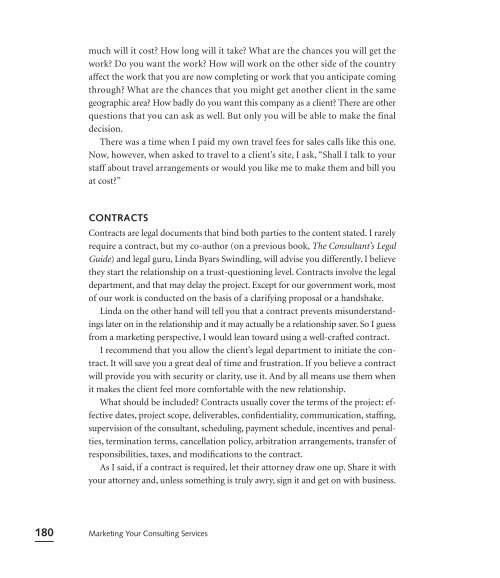- Page 3:
About Pfeiffer Pfeiffer serves the
- Page 6 and 7:
“In her new book, Elaine continue
- Page 8 and 9:
“Elaine has done it again—a boo
- Page 10 and 11:
Copyright © 2003 by John Wiley & S
- Page 13 and 14:
CONTENTS Dedication ix List of Figu
- Page 15 and 16:
SEVEN Prospecting in All the Right
- Page 17 and 18:
LIST OF FIGURES AND EXHIBITS ONE Fi
- Page 19:
Figure 9.5 Expanding the ABCs: Addi
- Page 22 and 23:
xx almost hands-on guidance, she in
- Page 25 and 26:
PREFACE It is rare that I am writin
- Page 27 and 28:
• I promise to teach you creativi
- Page 29:
One Last Thing I have lots of last-
- Page 32 and 33:
xxx Celia Rocks, publicist, thanks
- Page 34 and 35:
2 Market Research and Market Plans
- Page 36 and 37:
4 receive something to put in a box
- Page 38 and 39:
6 it that. Whether you like it or n
- Page 40 and 41:
8 add value for your clients? Do yo
- Page 42 and 43:
10 6. If your attitude about sellin
- Page 44 and 45:
12 A: Assess the Situation Assessin
- Page 46 and 47:
14 tools available to you. Try to s
- Page 48 and 49:
16 • Start a file of marketing id
- Page 51:
Assess the Situation L part ONE
- Page 54 and 55:
22 As mentioned earlier, a marketin
- Page 56 and 57:
24 Luick tip . . . Subscribe to the
- Page 58 and 59:
26 My customer base suggests that:
- Page 60 and 61:
28 Marketing Your Consulting Servic
- Page 62 and 63:
30 Luick tip . . . One of the easie
- Page 64 and 65:
32 Marketing Your Consulting Servic
- Page 66 and 67:
34 • If you are currently using a
- Page 69 and 70:
External Assessment How Do Your Com
- Page 71 and 72:
5. How do your competitors’ prici
- Page 73 and 74:
Where to Get the Scoop Where can yo
- Page 75 and 76:
If you decide that the survey will
- Page 77 and 78:
keting, authors Ries and Trout clai
- Page 79 and 80:
It doesn’t have to be that diffic
- Page 81 and 82:
you are known for and of what you a
- Page 83:
2. Most consultants offer similar s
- Page 86 and 87:
54 may start out with a white busin
- Page 88 and 89:
56 You may also serve on advisory b
- Page 90 and 91:
58 Luick tip . . . If you might use
- Page 92 and 93:
60 through your logo. I have had pe
- Page 94 and 95:
62 • Produce just enough brochure
- Page 96 and 97:
64 Your Bio Sketch If you’ve been
- Page 98 and 99:
66 OTHER IMAGE BUILDERS Sometimes t
- Page 100 and 101:
68 Marketing Your Consulting Servic
- Page 103:
Build a Potential Client Base L par
- Page 106 and 107:
74 dozens of personal notes, or you
- Page 108 and 109:
76 Marketing Your Consulting Servic
- Page 110 and 111:
78 Demonstrations or Showcases Demo
- Page 112 and 113:
80 • Once your basic presentation
- Page 114 and 115:
82 Considerations: • Select a cau
- Page 116 and 117:
84 • Select something that is eas
- Page 118 and 119:
86 professions it is appropriate to
- Page 120 and 121:
88 Luick tip . . . Three of the mos
- Page 122 and 123:
90 Website Your website should be s
- Page 124 and 125:
92 • Be sure to check the copyrig
- Page 126 and 127:
94 • Be aware of the many variabl
- Page 128 and 129:
96 Considerations: • Identify the
- Page 130 and 131:
98 Obtaining Information • Reques
- Page 132 and 133:
100 “We’re getting ‘around’
- Page 134 and 135:
102 reason is so that they will see
- Page 137 and 138:
Your Marketing Plan Can You Market
- Page 139 and 140:
You could also save time by finding
- Page 141 and 142:
Commitment also means that you cont
- Page 143 and 144:
What’s the Minimum I Need to Know
- Page 145 and 146:
Listen. Listen to whom? Everyone. T
- Page 147 and 148:
Exhibit 6.1. Your Marketing Plan, C
- Page 149 and 150:
products and services, position, pr
- Page 151 and 152:
You need to determine whether you w
- Page 153 and 154:
some that require the entire year.
- Page 155 and 156:
mail do not work very well for prom
- Page 157 and 158:
azine advertising or sponsorships,
- Page 159 and 160:
process that ensures you can comple
- Page 161 and 162: one phone call after five months. Y
- Page 163 and 164: Exhibit 6.2. Annual Marketing Plann
- Page 165 and 166: quarter. Contract amount is also li
- Page 167 and 168: 6. List your company in free direct
- Page 169 and 170: Prospecting in All the Right Places
- Page 171 and 172: into someone who frankly cannot use
- Page 173 and 174: Exhibit 7.1. Five-Step Prospecting
- Page 175 and 176: Luick tip . . . Examine your mailin
- Page 177 and 178: How can you select another industry
- Page 179 and 180: If you have not conducted this kind
- Page 181 and 182: July 12, 20xx Exhibit 7.4. Sample I
- Page 183 and 184: Letter Mechanics The mechanics of t
- Page 185 and 186: will be in your area next Tuesday o
- Page 187 and 188: How About Results? I enjoy the proc
- Page 189 and 190: tion, a proposed approach, a timeli
- Page 191 and 192: Figure 7.1. Prospecting Is Being a
- Page 193: Contact Potential Clients L part TH
- Page 196 and 197: 164 RAINMAKER? The term rainmaker c
- Page 198 and 199: 166 YOU HAVE AN APPOINTMENT—NOW W
- Page 200 and 201: 168 Exhibit 8.1. What to Ask Potent
- Page 202 and 203: 170 First, it seems too sales-like
- Page 204 and 205: 172 for what is working well or for
- Page 206 and 207: 174 Ask About Money During first me
- Page 208 and 209: 176 • Wrap-up close: Summarize th
- Page 210 and 211: 178 After Your Sales Call Follow Up
- Page 214 and 215: 182 4. The last paragraph of this c
- Page 216 and 217: 184 Gerald Weinberg, author of The
- Page 218 and 219: 186 do so. The ebb associates visio
- Page 220 and 221: 188 service, hot food, and a friend
- Page 222 and 223: 190 In Closing As you end your work
- Page 224 and 225: 192 One of the most important thing
- Page 226 and 227: 194 Individuals at the “take-char
- Page 228 and 229: 196 Individuals at the “task-orie
- Page 230 and 231: 198 of the styles on both sides of
- Page 232 and 233: 200 for someone they met coming in.
- Page 234 and 235: 202 tude gives them an upbeat focus
- Page 236 and 237: Figure 9.4. Adapt to Your Client’
- Page 238 and 239: 206 How Much Time Can Referrals Sav
- Page 240 and 241: 208 Build Relationships Figure 9.5.
- Page 242 and 243: 210 Exhibit 9.4. Continuously Impro
- Page 244 and 245: 212 4. Determine how many of your c
- Page 246 and 247: 214 ESTABLISH A WEBSITE What can yo
- Page 248 and 249: 216 Your website is the only market
- Page 250 and 251: 218 Luick tip . . . If you have wri
- Page 252 and 253: 220 MARKETING: TAKE ACTION 1. Visit
- Page 255 and 256: Marketing Can It Be Fun? As a consu
- Page 257 and 258: Compare and Combine Risk Taking Exp
- Page 259 and 260: The year Babe Ruth hit the most hom
- Page 261 and 262: Asking “What if?” can be just a
- Page 263 and 264:
A friend of mine who had never serv
- Page 265 and 266:
8. Incubate Remember all those time
- Page 267 and 268:
Personally I like to sit down with
- Page 269 and 270:
most were probably unaware that the
- Page 271 and 272:
Ask What’s Good? and What If? The
- Page 273 and 274:
The company remembers the first tim
- Page 275 and 276:
MARKETING AND CREATIVITY: A PERFECT
- Page 277:
Where to Look for New Ideas Sometim
- Page 280 and 281:
248 Do Things Differently Marketing
- Page 282 and 283:
250 Marketing Your Consulting Servi
- Page 284 and 285:
252 3. Share the load. Find someone
- Page 286 and 287:
254 ebb’s THIRTEEN TRUTHS I intro
- Page 288 and 289:
256 for your clients, you will see
- Page 290 and 291:
258 red to connote power, or making
- Page 292 and 293:
260 • Research by September 10
- Page 294 and 295:
262 September 30-November 5 • Wor
- Page 296 and 297:
264 Goal: Bring in Six New Clients
- Page 298 and 299:
266 Now read the letters a second t
- Page 301 and 302:
READING LIST Beckwith, H. (1997). S
- Page 303 and 304:
INDEX A ABCs of marketing: descript
- Page 305 and 306:
your client’s, 153; marketing pla
- Page 307 and 308:
Learning International, 239 Learnin
- Page 309 and 310:
Out-of-town clients, 179-180 The Ov
- Page 311:
179-180; rainmaker concept of, 163-
- Page 314 and 315:
282 Newport News Shipbuilding, Kohl
- Page 316 and 317:
• Participant’s workbook Contai
- Page 318:
MODEL A graphic depiction of a syst












